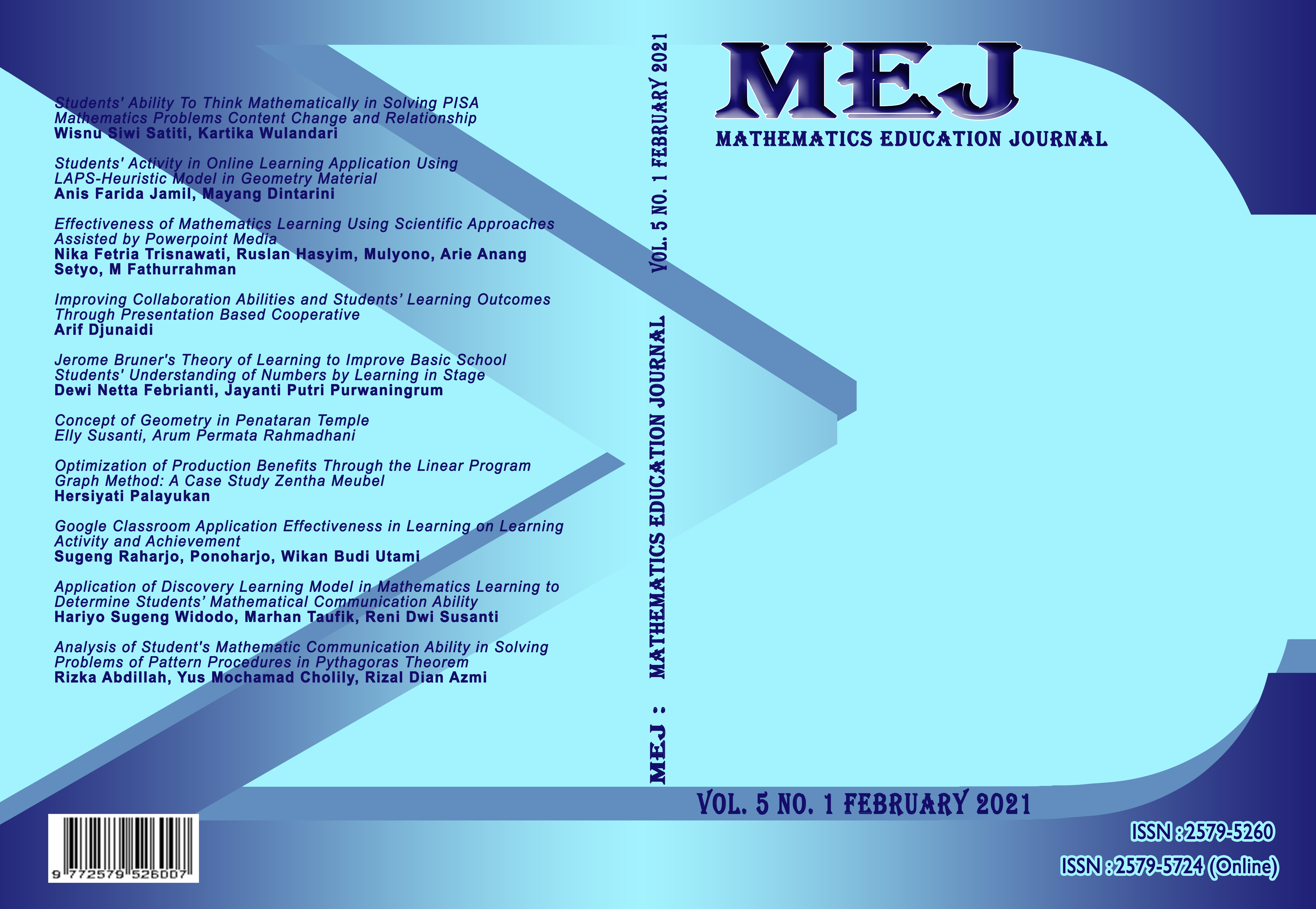Improving Collaboration Abilities and Students’ Learning Outcomes Through Presentation Based Cooperative
DOI:
https://doi.org/10.22219/mej.v5i1.15246Keywords:
cooperative learning, collaborative skills, learning outcomesAbstract
Students need to be optimally facilitated in expressing ideas and ideas in their minds through collaborative activities in the learning process. The purpose of this study was to explore the improvement of collaboration skills and student learning outcomes through presentation-based cooperative learning in the mathematics learning strategy subject. The research approach is qualitative and a type of classroom action research. The subjects in the study were 37 students who took the mathematics learning strategy course. Data collection was carried out through observation, tests, and field notes. The results showed that the collaborative abilities of students from the first cycle to the second cycle increased. The ability to interact effectively with fellow students, the ability to guide and lead peers, work effectively in groups, and the ability to manage tasks systematically increased, but the ability to be responsible did not show any improvement. The completeness of student learning outcomes at a predetermined minimum completeness score of 75 has increased, 76% of students complete in the first cycle and 84% of students complete in the second cycle.
Downloads
References
Anantyarta, P & Sari, RL. 2017. Ketrampilan Kolaboratif dan Metakognitif melalui Multimedia Berbasis Means. Jurnal Biologi dan Pembelajaran Biologi. Volume 2 Nomor 2 (p-ISSN 2527-7111; e-ISSN 2528-1615).
Greenstein, L. 2012. Assessing 21st Century Skills: A Guide to Evaluating Mastery and Authenthic Learning. California: Corwin A Sage Comany.
Karali, Yalçin & Aydemir, Hasan. 2018. The effect of cooperative learning on the academic achievement and attitude of students in Mathematics class. Academic Journal. Vol. 13(21), pp. 712-722, DOI: 10.5897/ERR2018.3636. ISSN: 1990-3839.
Katz, S. & Stupel, M. 2015. Promoting Creativity and Self-efficacy of Elementary Students through a Collaborative Research Task in Mathematics: A Case Study. Journal of Curriculum and Teaching. Vol. 4, No. 1.
Lie, Anita. 2010. Cooperative Learning. Jakarta: PT Grasindo Widia Sarana Indonesia.
Onrubia, J., Rochera, M.J, & Engel, A. 2015. Promoting individual and group regulated learning in colaborative settings: An experience in higher education. Electronic Journal of Research in Educational Psychology. Vol. 13. Issue: 1. Page: 189-210
Pons, R.M., Prieto, M.D., Lomeli, C., Bermejo, M.R., & Bulut, S. 2014. Cooperative learning in mathematics: a study on the effects of the parameter of equality on academic performance. Anales de psicología. Vol. 30, no. 3, 832-840.
Slavin, Robert E., 2008. Coooerative Learning, Research and Practice.
Trilling, B., & Fadel, C. 2009. 21st Century Skills: Learning for Life in Our Times. New York: Jossey-Bass.
Turgut, S. & Turgut, I.G.2018.The Effects of Cooperative Learning on Mathematics Achievement in Turkey: A Meta-Analysis Study. International Journal of Instruction. Vol.11, No.3
Woolfolk, Anita. 2008. Educational Psychology, Active Learning Edition, 10th Edition.
Yuan, J., Xia, Y., & Liu, H. 2019. Assessment of Collaborative Problem Solving Based on Process Stream Data: A New Paradigm for Extracting Indicators and Modeling Dyad Data. Frontiers in Psychology. Volume 10.
Zakaria. E., Chin, L.C & Daud, Y. 2010. The Effects of Cooperative Learning on Students’ Mathematics Achievement and Attitude towards Mathematics. Journal of Social Sciences. 6 (2): 272-275.
Zakaria, E., Solfitri, T. , Daud, Y., & Abidin. Z.Z. 2013. Effect of Cooperative Learning on Secondary School Students’ Mathematics Achievement. Creative Education. Vol.4, No.2, 98-100.
Downloads
Published
Issue
Section
License
Copyright (c) 2021 arif djunaidi

This work is licensed under a Creative Commons Attribution-ShareAlike 4.0 International License.
Authors who publish with MEJ (Mathematics Education Journal) agree to the following terms:
For all articles published in MEJ, copyright is retained by the authors. Authors give permission to the publisher to announce the work with conditions. When the manuscript is accepted for publication, the authors agree to automatic transfer of the publishing right to the publisher.
Authors retain copyright and grant the journal right of first publication with the work simultaneously licensed under a Creative Commons Attribution-ShareAlike 4.0 International License that allows others to share the work with an acknowledgment of the work's authorship and initial publication in this journal.
Authors are able to enter into separate, additional contractual arrangements for the non-exclusive distribution of the journal's published version of the work (e.g., post it to an institutional repository or publish it in a book), with an acknowledgment of its initial publication in this journal.
Authors are permitted and encouraged to post their work online (e.g., in institutional repositories or on their website) prior to and during the submission process, as it can lead to productive exchanges, as well as earlier and greater citation of published work (See The Effect of Open Access).

This work is licensed under a Creative Commons Attribution-ShareAlike 4.0 International License.










